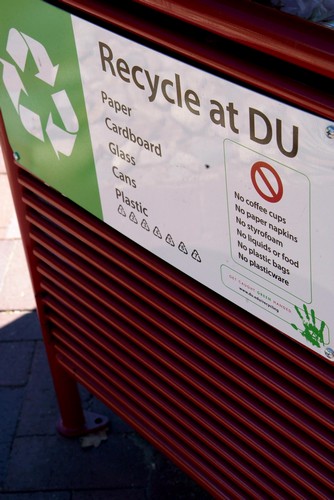 Photo by: Katy Owens
Photo by: Katy Owens
What you throw into a recycling bin can do more harm than good.
Contaminated recycling can cause entire batches to be thrown away, be very costly to recycling companies and reduce the positive impact recycling can have on the environment.
Many students throw anything they think can be recycled into the recycling bin. However, the whole batch of recycling is contaminated if a non-recyclable item is in the batch. Single-stream recycling, which we use at DU, allows all recyclable materials to be collected in one batch, also means that we need to be more conscious of what we toss into the blue bins.
The biggest contaminate in single-stream recycling is plastic bags. While certain plastic bags can be recycled, they must go in special collection containers, typically found in grocery stores.
It’s best to avoid the plastic bag altogether and use your own reusable bags or backpacks whenever possible. If you must use a disposable bag, go for a brown paper bag, which can be recycled easily.
When recycling plastic items, make sure any food residue is rinsed out and remember that Styrofoam containers, “to-go” containers, plastic plates and plastic tubs cannot be recycled.
If you’re unsure whether a plastic item can be recycled, check if it has a #1-7 label. If there is, it can go in the bins regardless of the number.
Anything with a waxy coating cannot be recycled, many cups for coffee or tea have this waxy coating to contain liquid. Try to cut back on the coffee cups from Jazzman’s and Starbucks by bringing your own reusable mug. Jazzman’s offers a 30 cent discount when you use a reusable mug and a free drink with the purchase of an Eco Mug.
Also, while all paper is fine to be recycled (avoid shredding), overnight mailing envelopes made of Tyvek (polyethylene fiber) should be thrown away.
In addition to properly recycling, students can take advantage of the many waste-reducing opportunities in the dining halls, such as composting.
More than just food can be composted. Napkins, wax-lined cardboard, the take-away cartons in Nagel and tea-bags can all be composted. Some of the few things that aren’t compostable are cupcake wrappers, cracker wrappers and creamer cups.
While recycling and composting are positives for the environment, we must be careful not to let that knowledge get the best of us. According to Sara Neuder, a sophomore biology major, people often justify buying more of a product because it can be recycled, while the better option is always to use less in the first place.
Neuder is a member of DUET DU Environmental Team, the Sustainability LLC and the Sustainability Council.
“I would justify buying a plastic water bottle because I could recycle it later, but recycling isn’t incredibly efficient and oftentimes, those plastic water bottles end up in landfills or the ocean along with the rest of the trash,” said Neuder. “So buying smart is definitely the way to go, and maybe avoid using something if it’s not absolutely necessary.”
With a water-bottle filling station or water fountain in every building on campus, plastic water bottles are generally unnecessary, creating an easy way for students to contribute to increasing DU’s sustainability.
You don’t have to be on the sustainability council to make an impact. Simply being more aware of how recycling programs work and decreasing your use of unnecessary products can make them more successful and increase their positive effect on the environment.










